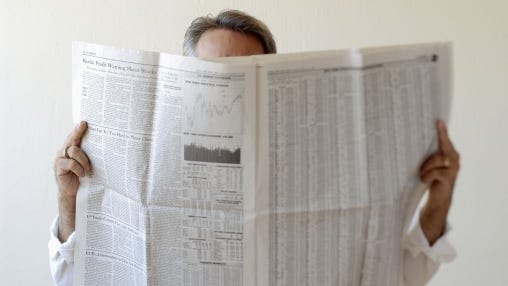
TV and newspapers: Detroit media history
The Detroit Free Press has been publishing since the mid-19th century.
There’s a wonderful scene in the movie “American Graffiti” where a confused high school grad seeks out the radio legend Wolfman Jack to make a request. He climbs a remote broadcast tower where he finds a bearded man working by himself.
“Are you the Wolfman?” the young man asks.
The man laughs and says no, but he promises to try and get the request to the famous broadcaster, who, he says, is likely in some exotic place around the world. The two shake hands. But as the young man leaves, he glances through the slightly ajar door and sees the man howling into the microphone, and realizes he actually just met his hero, working all alone, after midnight.
I thought about that scene after I heard that Warren Pierce had died. Warren, who was 82, was one of those radio lifers, a man who worked at various stations, mostly WJR-AM, for nearly 50 years, and still never got enough. He talked. He interviewed. He hosted. He announced. There was no subject he wouldn’t tackle, no personality with whom he wouldn’t chat.
Although he might get recognized from some TV work, he was mostly, like the Wolfman, a voice you knew more than a face, a voice you trusted, a voice you liked.
There were once many guys like Warren. Not so anymore. They are fading, retiring, dying, and with them, an archetype that will not be seen again. Their vocal styles varied, from velvet to sandpaper, from baritone to bass. But they had one thing in common.
They lived to be heard.
‘It’s Warren Pierce … ‘
Warren lived to be heard as well. His voice was on the higher side, pleasantly energized, and infused with a curiosity that suggested there was no one in the world more fascinating than the person he was talking to.
He supposedly interviewed over 70,000 people, and I believe it, because Warren was the kind of guy to keep track. He saved his interviews. He saved his sound effects. He saved his sound bites. When he came in to do a shift, he brought everything with him, like a traveling road show.
“It’s Warren Pierce on a Monday …” he’d say, or a Tuesday, or a Saturday morning. Over the decades, for WJR, he had a weekday show, a weekend show, he did the Michigan football games, he substitute-hosted. He was, for a while, omnipresent, and in the early days he even traveled for reporting, to the Oscars, to Europe, to the wedding of Prince Charles and Princess Diana.
But as the years passed, such assignments dwindled. Radio became angrier, political, you had to take a side, and Warren wanted only to be on the side of the microphone that went out. He left radio and did some TV for a while. But his heart was in the booth. He returned to WJR and was a utility man, filling in everywhere, including a show I have done there for the last 29 years.
It was here that I got to know Warren better. He was so earnest, so devoted to any program he did, that he sometimes made us laugh. He’d bring 20 soundbites for a segment that was scheduled for four minutes. He’d ask a question so full of facts, there was little time for an answer.
But he wore his passion on his sleeve. And he talked. And talked. And talked some more. Even in the last few years, when he was reportedly battling medical challenges, he spoke to his audience through Facebook.
“I’m going to miss you so much!” he posted last year.
And that was the thing that separated Warren and his generation of broadcasters from so many today who use the microphone solely to elevate their brand.
He cared about his listeners.
A changing art form
Try this experiment sometime. Close your eyes, and listen to someone speak to you. It’s a whole different experience than seeing your conversationalist. It feels closer. More intimate. And that’s the beauty of radio. Someone miles away, maybe thousands of miles, can speak to you as if you’re in the room.
It’s an art form that is disappearing, which saddens me. Podcasts are the new radio, iPhones are the new radio, Spotify is the new radio, anyone can listen to what they want, when they want, for as much or as little as they want — often with images as well as sound. In order to stand out, you need to be controversial, loud, or famous.
Which doesn’t leave much room for the traditional radio folks, the ones who truly enjoyed taking phone calls, chatting about the local news, the crazy weather we’re having, the visiting musician or the annual festival. There are so many dedicated people who have been silenced, disenfranchised or lost to age and illness. And few taking their place.
Here’s to all the old voices, who didn’t care if they were in a remote tower, after midnight, as long as they got to be on the air and speak to the people. There is a magic you feel sitting behind a microphone, and even though the audience can’t see you, they can tell if you’re listening, can tell if you care, can tell if you love it.
Warren Pierce loved it. What better thing can a person say about his work?
Contact Mitch Albom: malbom@freepress.com. Check out the latest updates with his charities, books and events at MitchAlbom.com. Follow him @mitchalbom on x.com.